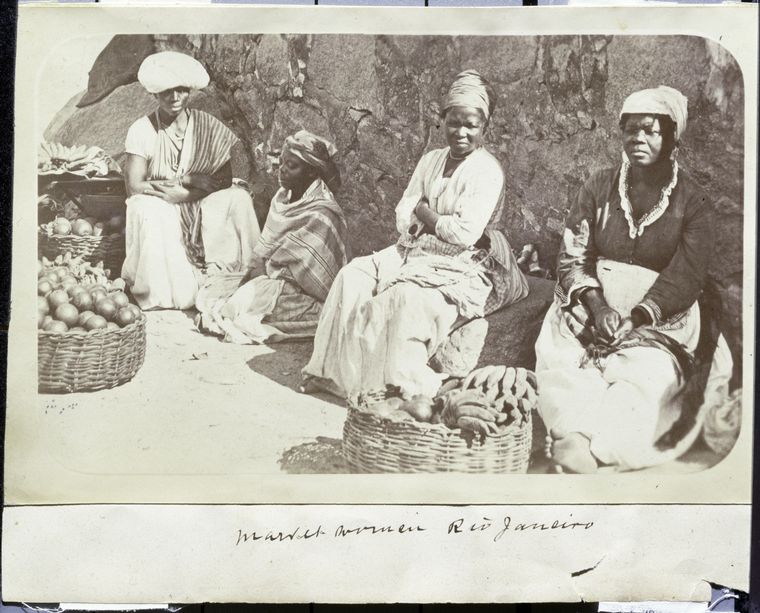came to leave the Bursa corvette and remain in Brazil to teach the
local Moslems about proper Islam.//

Market women in Rio de Janeiro
Blacks in America
Based on the research I have done about the blacks’ situation, they are from among
the peoples of Africa. Sixty years ago European pirates went to the shores of
Africa and bought a large number of people from chiefs that they called ‘melik’
(king). These chiefs were constantly at war with one another and in accordance
with their rules of engagement, they could sell their prisoners to anyone else. In
this way, the number of blacks in American countries increased markedly.
Because of the slavery of blacks, a few years ago there was a great war between
the North and South in America. In the end, they made peace by agreeing that
blacks could not be bought and sold. Now, most of the blacks in America have
been freed from the chains of slavery. Those who remain slaves will become free
after a specified period. The number of Moslems among the blacks in America
is quite small. And since these Moslems left their home countries at a very young
age, they are quite ignorant. When some of these Moslems see me they are very
pleased and invite me to their homes to teach them the tenets of Islam.
I Go to Their Homes
After I explained the blacks’ situation and their requests to the Captain he gave
me permission to visit their homes. They have turned a big house on the outskirts
of the city into a mosque and worship there secretly. I went with an interpreter
who is apparently a Jew. Later, I will relate all of his dastardly deeds and immorality.
I conducted evening prayers as an imam. After performing the obligatory acts and
greeting them, the congregation joined me in ‘sünnet’ (sunnah). They don’t know
how to pray as a congregation and normally pray by themselves.
I noticed one of them praying by himself. After saying “Allahü ekber” (God is
greatest), he bent once to the right and once to the left. Before ‘rükû’ (bowing
down and putting the palms of his hands on his knees) he went straight to the ‘secde’
(prayer rug) and kissed it. He repeated this a number of times. Then, he said
whatever came into his head and left prayers without saying goodbye. While
praying he coughed and spit the thing in his mouth into a bowl he had put in place
beforehand. Afterwards I realized that the Jew interpreter had taught him this
illegitimate action, because he showed quite a bit of respect toward the Jew and
asked his advice on everything.
When I had the chance I asked the interpreter what his religion was. In
response he told me that he was a Moslem but that he had left his country before
learning the basic tenets of Islam. He said that he knew the blacks well and that
since he was in a foreign country he could not perform his religious duties properly.
Adding that the heat is quite terrible here, he confessed that last year he couldn’t
fast for 15 days during Ramazan but since he had a valid excuse God would not
hold him responsible.
I listened to him in amazement but since I needed his services I could not voice
my objections. I asked him to tell the blacks that henceforth they must conform
to everything I say and do. First of all, I began with a sermon and advice, explaining
God’s oneness and power and the endless miracles of the Great Prophet, who is
deserving of the most exalted greeting. In this way, I stayed with them for 13 days
and explained to them the mandates and prohibitions of religion, to the best of my
ability.
In any case, within this period I did not see any effect whatsover from the efforts
I had expended. I judged that this stemmed from the interpreter not really
knowing the Portuguese language very well at all. But later, after I myself learned
Portuguese, I understood that this was not the only reason. Evidently, in accordance
with the villainy of his nature, the interpreter had contorted my statements. Since I
had run out of energy and, in particular, because my leave had expired, I returned
to the ship.

Black slaves attending a family in Brazil, 1860
The Captain’s Fear and Anxiety
Upon returning to the ship I spoke with the Captain. Having not seen me in many
days, he reprimanded me, saying “I regret having given you leave. Henceforth,
you will not meet with the local Moslems. If the Brazilian Government were to
hear about this they might create a problem, accusing the Ottoman Government
of sending missionaries with the ships to create divisions among the people. And
I will be the one held responsible. I have heard that the Moslems here hide their
religion out of fear. The people in this country are ignorant and they are known
for their wickedness.”
In response, I explained to him the state and characteristics of the Moslems I saw,
their ignorance and heresies vis-a-vis basic religious knowledge and how I tried to
motivate their religious feelings. He then said to me “If I give you permission I
will be called to account by our government. If I don’t give you permission, I will
have failed to fulfill the stipulations of Islamic brotherhood. Since a Moslem like
us has not set foot in this country since the inception of Islam, it is incumbent upon
us to remedy the shortfalls in this community’s knowledge of religion.” For three
days and three nights we considered the matter from all sides.
They Request a Man from the Moslem Captain
Then, a few of the blacks came aboard the ship. Because the Captain knew
English, they brought with them an interpreter who knew both English and
Portuguese. They addressed the Captain, saying “up till now we thought that all
the white people in the world were Christians and only blacks were Moslems.
Therefore, we are very happy to see you.” Then they requested that someone be
left behind to teach them about Islam.
The Captain Gives Me Permission to Stay
After the Captain spoke with the blacks, he left it up to me as to whether or not
I would remain here. I said that I would remain for the pleasure of God. The
next day, putting my faith in God, I boarded a rowboat and went to shore. At
the pier I was greeted with affection by those who had come.
Without any delay, we boarded a train and headed toward the outskirts of the city.
They brought the Jew interpreter that I described before with them to help me
meet them all. He had me begin by writing down and memorizing some essential
words in Portuguese that I needed to know. Since there was no one for me to talk
with in my native tongue, in a short time I learned this new language enough to
get by.
At this point our ships set sell toward their intended route. Before leaving,
though, the Captain told the Brazilian authorities that I would be staying in the
country to tour around. They had responded by saying that wherever I was I
would be shown hospitality and sent on. I only learned about this much later.

Black slaves working a field in Brazil.
I Begin to Give Lessons to the Moslems
I settled into a house that had been prepared for me. Five hundred people gathered
around me so I began to give lessons a few times a day, at various times. Among
the people there were none who knew anything beyond the Kur’an’s “Amme cüzü”
(the section of the Kur’an that begins with the 78th sura and contains all the short
suras to the end of the book, formerly used as the second Arabic reading book in
schools.) Those who had knowledge of the Amme cüzü were from the elite members
of the group, who have been given the title “Fa”, meaning great scholar.
Since their language is quite different, they have difficulty pronouncing Arabic letters.
They use the European alphabet and there are no equivalents for the Arabic letters se,
ha, hı, zel, sad, dad, ayın, gayın and he. They have to pay very high prices for a Kur’an.
But they buy them not for reading or learning. The Kur’ans they buy are left on top
of chests merely as a blessing.
I began teaching and training by selecting young people, along with adults who
were interested. Each day in the afternoon I had a general meeting to teach them
all the basic tenets of Islam. Both the children and the adults memorized the hadis
relating to praying five times a day. I prepared a short book in Portuguese, using
Arabic letters. To the best of my ability, in the book I translated God’s attributes,
the prophets – may peace be upon all of them, abdest (washing), praying, fasting,
the hajj and alms, adding some advise for them, as well. Most of my students
memorized the book and behaved accordingly.
Those Who Attain Honor With Islam
One day, one of the leaders of the community came to me with another fellow.
They greeted me as I had taught them to. Previously, they would use a special
way of greeting when meeting a scholar: they would bow down with their heads
uncovered and then rub their eyes and faces on the ground, maintaining that
position until given permission to lift their heads from the ground. With God’s
grace, I was able to get all the men to abandon this un-Islamic practice but some
of the women continued to behave this way.
subject...after accepting the greetings of these men who had come to me, I
respectfully gave them permission to be seated. The man began by saying
“This fellow has wanted to become a Moslem for a long time but since he is
poor he has been unable to become a Moslem. But now he has obtained an
amount of gold.”
When I asked why he obtained the gold, he responded by saying “When a man
wants to become a Moslem, he pays a gift of money to the guide as an indication
of the sincerity of his intention. The guide then gives the man a document
showing that he is a Moslem, enabling him to be shown respect by other Moslems.
In fact, for this document your interpreter won’t accept a penny less than 20
pieces of gold and turns the applicant away. He said that the Prophet – may peace
be upon him, has ordered this.”
Immediately, I told the man about the “Kelime-i Şahâdet” (Confession of Faith).
And instead of accepting the money he offered me, I gave him some of my own
money. After this incident I organized a big meeting and told everyone that it is
forbidden to take money from someone wanting to become a Moslem. I asked
those attending to inform others about this. As a result, within a short time the
number of Moslems rose to 19,000.
//END of PART VIII//

Hiç yorum yok:
Yorum Gönder